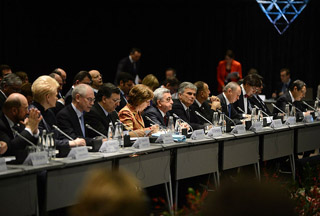«20 points on the Eastern Partnership post-Vilnius» (Non-Paper)

13 member states of the European Union – Bulgaria, Czech Republic, Estonia, Finland, Hungary, Latvia, Poland, Romania, Sweden, Slovakia, Germany and the Great Britain, have worked out an action plan for continuing cooperation with countries of the Eastern Partnership programme. This a Non-Paper document, which was dicussed by the Council of the EU on 10 February, but it wasn’t published officially. The first publication about this document was by the Radio Liberty on 7 February, which informed about some of the key points of this project. In Armenian media it became known as “European Package”. In fact the document is called «20 points the Eastern Partnership post-Vilnius», our partners from Brussels have provided us the draft of this document. As we released, this is a very interesting roadmap for extending Europe’s policy to East from the EU teritory, to the EaP members and Russia. The draft document includes points on political, civic, economic, energy, security and other issues.
Before presenting the document, we should remind, that Armenia, as the Ukraine, Georgia, Moldova, Azerbaijan and Belarus, also participates in the EU’s Eastern Partnership project since 2009, although Armenian leadership did not initial the Association/DCFTA agreement with the EU in the Vilnius summit (November 2013), as it had been planned.
Here is the complete Non-Paper.
20 points on the Eastern Partnership post-Vilnius
Strengthen visibility
- Step up outreach efforts, such as the “Stronger Together” campaign, in EaP partner countries significantly to spread information and respond to disinformation on the EaP, including through engagement of public diplomacy experts.
- Disseminate clear economic and other gains from AA/DCFTAs and participation in EaP. Promote and publish studies that explain long term gains of the EaP, including the possible impact on Russia and the Customs Union/Eurasian Economic Union, and negate unfounded claims of costs.
- Enhance contacts with all sectors of society in EaP countries, including through visits, seminars in EUMS/partner countries, preferably involving also those not already convinced of the benefits of closer EU relations. Specific activities should be aimed at national minorities and remote regions.
Calibrate and enhance the Partnership
4. Keep the EaP concept and offer, while allowing for more differentiation between partner countries; continue to encourage reforms through smart use of conditionality.
5. Speed up internal procedures in order to allow for signature of AA/DCFTAs with Moldova and Georgia as soon as possible, and no later than end August 2014; assist these partners in the process of AA/DCFTA provisional application.
6. Encourage EaP frontrunners by making full use of the “more for more” concept, including through prioritizing additional EU funding, within existing instruments as well as the current multiannual financial framework, and support through IFIs.
7. Start exploring some sort of “European package” as a station beyond AA/DCFTA, focusing on mobility, student exchanges, more twinning projects and increased participation in EU community programs and agencies.
8. Develop a model for a Common Economic Area ahead of the Riga Summit, as indicated in the Vilnius Declaration, contributing also tothe long-term goal of a wider common area of economic prosperity, based on WfO rules and sovereign choices, throughout Europe and beyond.
9. Elaborate a differentiated concept (“PCA+”) for the less ambitious EaPpartner countries (in the first instance for Armenia).
10. Enhance political dialogue with all partner countries on broader issues such as i.a. wider neighbourhood, and explore possibilities for enhanced cooperation in the security policy field, including through partner countries participation in EU missions, in line with FAC conclusions on CSDP.
11. Elaborate the multilateral format of the EaP; ensure regularity of formal sector ministerial meetings; cement the SOM format preparing ministerial meetings, secure high level interest from COM DGs and ministries in EUMS, including through visits; enhance cooperation with third countries and IFIs in supporting and implementing the EaP.
Support developments in partner countries
12. Ensure that Moldova and Georgia receive a constant flow of EU high-level visits with clear and constant messages regarding early signature of AA/DCFTA and the need for vigorous European reforms to make full use of agreements.
13. Continue engagement with Ukraine on a broad political spectrum and adjust the EU policy in light of developments.
14. Enhance mobility agenda: prepare for a smooth, well managed and secure implementation of visa free travel for Moldova;facilitate exchange of best practices on VLAP implementation.
15. Assist partner countries to improve energy efficiency to reduce dependency and improve competitiveness, for example through recently enlarged Energy Efficiency and Environment partnership with Eastern Europe (E5P).
16. Apply existing EU instruments to support civil society and key reforms, rule of law, fight against corruption and institutional reform in all EaPcountries.
17. Engage with Russia in a substantial, frank and open dialogue on integration processes m Europe. At the same time, underline that punitive actions and threats against EaPpartner countries are unacceptable.
18. Raise preparedness in expectation of further external and internal threats or actions against front-runners, such as trade embargoes, restrictions against migrantworkers, increased tension in protracted conflicts etc. A well-coordinated EU response to possible actions of this kind is essential.
19. Through informal contacts, and using positive attention and events in near future (BY: World Cup in Ice Hockey, AZ: Chairmanship of CoE May-Nov 2014), persuade Azerbaijan and Belarus to take positive steps on political prisoners for the benefit of relations with the EU.
20. Strengthen the EU’s role in the settlement of protracted conflicts, including, where applicable, enhanced coordination between relevant EU actors. Make use of AA/DCFTA implementation as a vehicle to strengthen contacts between Chisinau/Tbilisi and secessionist regions, and develop mutual incentives for contact.
By Aram Sargsyan


























